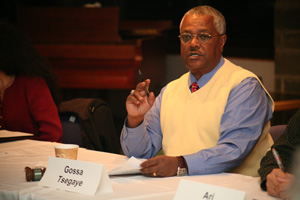News Editor Erin Geismar spoke with Tsegaye about his time on the council and his hopes for its future.

Erin Geismar: What does the faculty council do?
Gossa Tsegaye: It’s basically a group of faculty who are elected by the individual schools and division to represent the faculty issues from curriculum to policy, promotion, recruitment, retention – anything that has to do with the teaching, environment, classroom. Anything that has to do with your education, we’re involved.
EG: You mentioned … the faculty chair award. What is that?
GT: The chair award is given to a faculty council member, although it doesn’t have to be a member, who has been at the college for a long time. It’s based on their commitment and dedication to the betterment of educating you.
EG: Do you think students have a good idea of what the faculty council is?
GT: Students must open up their minds and eyes and ears to pursue the interests in other organizations on campus to see what they do. What does the staff council do? What does the dean’s council do? … All these things we do on campus has to do with the betterment of you guys and your education.
EG: What is a typical meeting of the faculty council like?
GT: Very animated, very civil and also focused — that’s my job. We usually have wonderful turnouts, usually over 95 percent of the [about 30 members of the] faculty council come to our meetings, which are once a month.
EG: What changes have been made in the time you have been chair?
GT: There have been a lot of changes, some things included student evaluations and … non-tenure eligible sabbatical. And there’s the governance, for example, discussing how to renew the handbook. I don’t think you have enough pages in your newspaper to write about all the things we do.
EG: [Can you explain] … the non-tenure sabbatical?
GT: [For] people at the college who have worked here for many years who have been promoted to associate [professors] and full-time professors, [it’s a program so they] can serve sabbatical like any full-time professor who is tenured. It’s really kind of a recognition and uplifting of their service to the point where they are on equal footing with the rest of the faculty.
EG: So would you say the faculty council is a support program?
GT: Of course. It’s a very important thing [to have].
EG: Now that you’ve stepped down, will you continue your
service on the council?
GT: To be honest with you, what it is for me is the opportunity to come in with fresh ideas and a fresh voice, with different ideas. I think it will put the council in great shape. The council will march on and will do better. It’s a difficult job at times but it can be done. To be the first non-tenure council chair, it just shows the respect that has been shown to me by the faculty at the college. So, it’s nice to be first. Hopefully because of my situation, it will give others the opportunity to step up. You don’t have to be tenured to be the faculty council chair. I proved with my position that you can run it.







